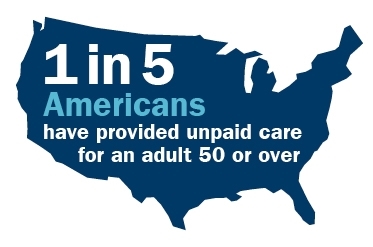Key Points
- 1 in 5 working-age Americans have provided care to an adult aged 50 and over
- Caregiving impacts financial planning for those who are caregivers, and those who receive it
- Tax deductions and Medicare reimbursement can provide financial support for caregivers
More than 48 million Americans provided unpaid care to an adult aged 50 and older in the previous 12 months, according to a 2020 study.¹
“The biggest concern with aging parents is around extended care,” says Tom Maki, Vice President at RiverSource Life Insurance Company. “With 70% of the population predicted to need some form of long-term care in retirement, there’s a strong probability at least one of your parents will need assistance.”2
The good news is, there are ways for caregivers to financially plan to protect their assets along with their parent’s estate, all while ensuring their loved ones age comfortably with financial stability.
Long-term care is evolving

It’s natural to assume parents may not need long-term care (LTC) if they’re moving in with family or modifying their own homes to age in place. But in either of those scenarios, your parents may still need the most common type of care: in-home assistance.
“Many people think private long-term care insurance only means nursing home coverage, but for many policies there’s a spectrum that includes home health care as well as more comprehensive care,” Maki says. “If your parents have long-term care insurance, they may qualify for benefits if they cannot perform just 2 of 6 ADLs — or activities of daily living — and those are pretty basic activities.”
Combining coverage types
Traditional LTC insurance has one distinct financial drawback: for those who don’t require caregiving, you’ll receive no support from the policy. “Today there are some new innovations in the industry that combine life insurance with LTC coverage,” Maki says. “If a parent doesn’t end up needing LTC, the life insurance death benefit passes income-tax-free to heirs.”
Maki cautions that it’s important not to “self-diagnose” and assume an elderly parent can’t get LTC insurance. “Even if they have some health issues, they may be eligible for coverage,” he says. “Your financial advisor can walk you through the application process and available options.”
Medicaid has limitations
You’ve probably heard that Medicaid covers LTC for those who can’t pay for it out of pocket. What you may not know is program rules require that assets be spent down before benefits kick in for LTC. The impact on a parent’s estate can be substantial, which is why many families look to asset transfers as a workaround. Just keep in mind that gifts of money, investments and property must take place at least five years or more before applying for Medicaid to meet eligibility requirements.
Medicaid requires that assets be spent down before benefits kick in for long-term care — and the impact on a parent’s estate can be substantial.
If your parents do have some LTC coverage, many states offer asset protection through the Long-Term Care Partnership Program, a collaboration between state governments and insurance companies. If your parents use up their LTC policy’s maximum life benefit and need to apply for Medicaid, their assets will be protected up to the amount paid under the policy from the program’s spend-down requirements. Once a parent is eligible, family members may qualify for Medicare reimbursement for approved caregiving services if qualifications are met.
Tax relief is available
Parents who don’t have LTC insurance and aren’t eligible for Medicaid may be able to deduct financial expenses for caregiving support. Generally, for medical expenses to be deducted, your parents must itemize deductions and pay for unreimbursed medical expenses — including qualifying LTC expenses — that exceed a certain percentage of adjusted gross income.
If you pay for the expenses of a dependent parent, you may qualify for the deduction if requirements are met. In addition to daily expenses such as travel and mileage for medical reasons, larger budget items such as doctor-recommended caregiving expenses or home renovations deemed necessary may also be deductible. For more information, visit the irs.gov website’s section for caregivers.
We can help
So, how do you begin talking to your parents about this sensitive topic? “It all boils down to one thing: Have the courage to have the conversation,” Maki says. “Suggest to Mom and Dad that there may be a better way than simply hoping things turn out the way we want them to.” We can help you weigh available options and how they could fit into your overall financial plan.